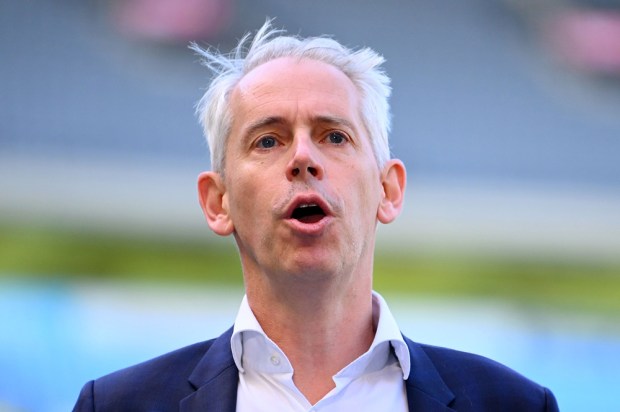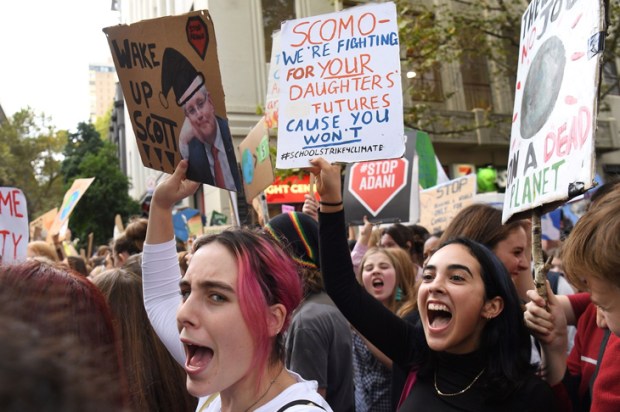Let me lay down two propositions. The first is that labour relations in this country are in a bad way, too centralised, too inflexible, too much a throwback to the pre-Howard 1980s and early 1990s. More and more people are coming around to something like that view. Soon it may be orthodoxy.
My second proposition is not an orthodox one at all. In fact, few people on either side of federal politics in Canberra would agree with me on this second claim of mine. Here it is. The fault for our current labour relations woes rests largely on three shoulders: our top judges on the High Court, our ‘far too much in love with centralism’ federal politicians and our big business elites. Don’t blame the unions. More of the sin lies at the feet of those big three.
Start with the former Howard government, of which there is no greater fan alive and working in an Australian university than I. Indeed, I used to bring university meetings to a halt by saying out loud how much I liked Howard. Yet he was too much the centralist and that sin is now coming back to haunt this country.
Go back to Work Choices. This Howard government legislation relied on the corporations power in our constitution to centralise industrial relations in Canberra. The recently deceased Mr Whitlam must have been green with envy at the time at such chutzpah. And Mr Howard had plenty of support from big business for this power grab from the States, because for the big end of town the ends justified the means.
The States were Labor at the time. They challenged the law on the basis that industrial relations were overwhelmingly a State matter. At the time I thought, and said, the States were right. Five of seven High Court judges disagreed. Yet I think that the Work Choices case was one of the worst reasoned and most implausibly justified decisions of the last 25 years, and believe me there is plenty of competition for that title. The framers and ratifiers of our Constitution would have been stunned at the Court’s handing this power to Canberra. It certainly didn’t look like an exercise in interpretation to me – more like an out-and-out re-writing of our Constitution to further denude it of its clear federalist components.
The result was that you moved from a system of comparative diversity and flexibility where different States had different regimes, to a one-size-fits-all centralised behemoth. So the obvious question that federalists who wanted more liberalised labour relations would ask people like me who liked the substance of Work Choices but nevertheless despised the legislation because of the way it emasculated federalism, was what would happen when Labor one day won power at the national level. What would happen when they could use the corporations power when it was their turn?
Big business pooh-poohed this concern. ‘They’ll never turn the clock back’, was the fatuous response from the big end of town. Meanwhile, the Coalition just regarded the State Labor governments as poorly run burdens that had to be borne. Next to no one saw the States as what the voters at State level wanted, and so should get.
Anyway, once the genie of ‘Canberra gets yet another power, as the High Court has now given them labour relations too’ was out of the bottle, it couldn’t and can’t be put back.
So when Labor ran the 2007 election based on a huge Work Choices scare campaign, they won. I said then and say now that had the High Court done its interpretive job and struck down the Work Choices legislation, Howard would have won that election. And we all would have been spared the Rudd/Gillard/Rudd fiasco. Oh, and today in 2015 we would without doubt have more liberal labour relations across the country than we do with the Fair Work straight jacket imposed from coast to coast.
And do any of you remember what the reaction of big business was when the unions ran this giant anti-Work Choices scare campaign? No? That’s because it was silence. Nada. Nothing. They basically sat on their hands.
But today we hear the BHP chief executive seeking changes to the workplace system. And the peak retail industry lobby group wants them too. We hear calls for Prime Minister Abbott to lead the charge for more liberalised workplace relations. Irony of all ironies, we even hear the big end of town and the Commission of Audit’s Tony Shepherd pleading for a more decentralised system, less one-size-fits-all. Things like a different minimum wage in each State are mooted.
Part of me just wants to cry ‘What a joke!’ and then bask in what the Germans call schadenfraude, the pleasure one gets from the misfortunes of others.
Alas, if it were just big business suffering then I would just shrug and say they deserve everything they are now getting. But of course the sclerotic, inflexible, over-centralised labour relations we have here in Australia are causing lots of other people to suffer, including teenagers who want an after school job and the less well qualified who need work. Don’t look at our unemployment rate. Check out our workforce participation rate; that’s the one that can’t be gamed by not counting those who have given up looking for work or those who’ve been put on some sort of disability payment.
That brings me to whether Mr Abbott ought to take the advice of the big end of town and lead the charge for labour relations liberalisation. Of course in a better world, one where federalism still operated in more than name only, one or more of the States could do this. What worked could be copied. What didn’t could be jettisoned. But our big three culprits have killed that off, the kind of diversity and flexibility you see in the US and Canada where real federalism still operates.
Not here though. And that being the case, I agree with Mr Abbott. Even if he weren’t in such political strife there should be no changes of any sort before an election. Right now voter trust in both parties is astoundingly low. The siren song coming from the big end of town should be wholly ignored. No big changes of any sort to labour relations without taking them to an election first.
Got something to add? Join the discussion and comment below.
Get 10 issues for just $10
Subscribe to The Spectator Australia today for the next 10 magazine issues, plus full online access, for just $10.
James Allan is Garrick Professor of Law at the University of Queensland (and author of ‘Democracy in Decline’)
You might disagree with half of it, but you’ll enjoy reading all of it. Try your first month for free, then just $2 a week for the remainder of your first year.













Comments
Don't miss out
Join the conversation with other Spectator Australia readers. Subscribe to leave a comment.
SUBSCRIBEAlready a subscriber? Log in